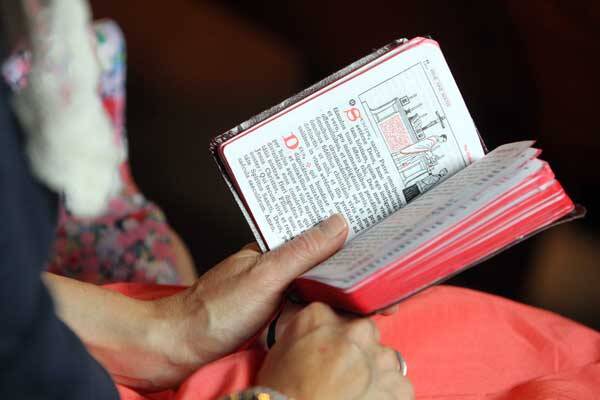A new translation of the Mass has been used in the nation’s Catholic parishes for less than three years, but there are signs that the language—often criticized as stilted and awkward—could be in for another edit.
“We’ve tried it, we’ve lived with it, we think it needs correction,” Atlanta Archbishop Wilton Gregory told a conference on liturgical reform last month in one of the most public and high-level expressions of discontent with the missal, as the Mass text is called.
Gregory was seconded by Bishop Robert Lynch of the Diocese of St. Petersburg, in an echo of comments last year by Bishop Robert Brom, now retired as head of the San Diego diocese, who said “the new missal needs corrective surgery and this should take place without delay.”
Reopening that process would be a momentous step.
The latest translation was approved only after a tortuous, decade-long struggle between those who wanted words and phrasings that sounded more like the original Latin text and those who thought that the proposed vocabulary sounded pompous and incomprehensible.
“It’s the creed! It’s not the SAT prep,” as comedian and practicing Catholic Stephen Colbert put it.
But with a big shove from the Vatican, which essentially took over the process and mandated the Latinate language, the more formal text won out.
Words such as “consubstantial” became part of the Mass, Jesus was not “born of the Virgin Mary” but is now “incarnate of” her, and before taking the host Catholics now say, “Lord, I am not worthy that you should enter under my roof” instead of “Lord, I am not worthy to receive you.”
That language dismayed some in the pews but was especially problematic for priests and bishops who have to say Mass every day, and a new survey released this week appears to give further impetus to a reform of the reform.
The national poll of priests and lay leaders in parishes around the country found that more than half of the 444 clergy who responded reject the new missal, by a margin of 52-42 percent.
Just 27 percent said the new translation has lived up to expectations. The smaller number of lay leaders who responded tended to be more positive about the changes.
The study was commissioned by the Godfrey Diekmann Center for Patristics and Liturgical Studies at St. John’s School of Theology in Collegeville, Minn., and carried out by the Center for Applied Research in the Apostolate at Georgetown University. The survey is based on 539 interviews, with a margin of error of plus or minus 4.2 percentage points.
The results were first published at the blog Pray Tell, which is operated by the Rev. Anthony Ruff, a Benedictine and liturgist at St. John’s who has been critical of the new Mass.
Among the other findings of the study:
* 75 percent of clergy and lay leaders say “some of the language of the new text is awkward and distracting.”
* 58 percent of clergy say they do not like the more formal style of language in the new text.
* 39 percent of clergy think the new missal is an improvement on the previous translation.
* 50 percent of clergy and lay leaders say the new translation urgently needs to be revised.
The Rev. Anthony Cutcher, president of the National Federation of Priests’ Councils, said the data should push the bishops to modify the texts.
“Armed with the latest data, we can take this opportunity to help craft a revision that stays true to the text and at the same time is accessible to all,” Cutcher told Pray Tell.
Critics of the new missal have also been buoyed by last year’s election of Pope Francis, who has shown himself to be far more relaxed about liturgical customs and a big change from Pope Benedict XVI, who was a stickler for old-fashioned rites and a chief proponent of the new English translations.
Moreover, bishops in other countries have in the past year taken advantage of the change of popes to call for a halt to implementing the new translations in their respective languages.
But church officials and experts in liturgy in Rome and the U.S. also cite numerous factors working against another effort at changing the language of the Mass.
One is that Francis has so many other problems and reforms he needs to address that tackling the liturgy—which is always one of the most divisive issues for church officials and Mass-goers—is relatively low on the list. In addition, he has not yet revamped the Vatican congregation that oversees liturgical matters, and the holdovers from Benedict’s pontificate are unlikely to welcome any changes.
Above all, they say, the American bishops are still catching their breath after such a long struggle with Rome, and one that they wound up losing. “I wouldn’t rule out the possibility of further changes, but (the bishops) are just tired of it,” said one U.S.-based liturgy expert.








